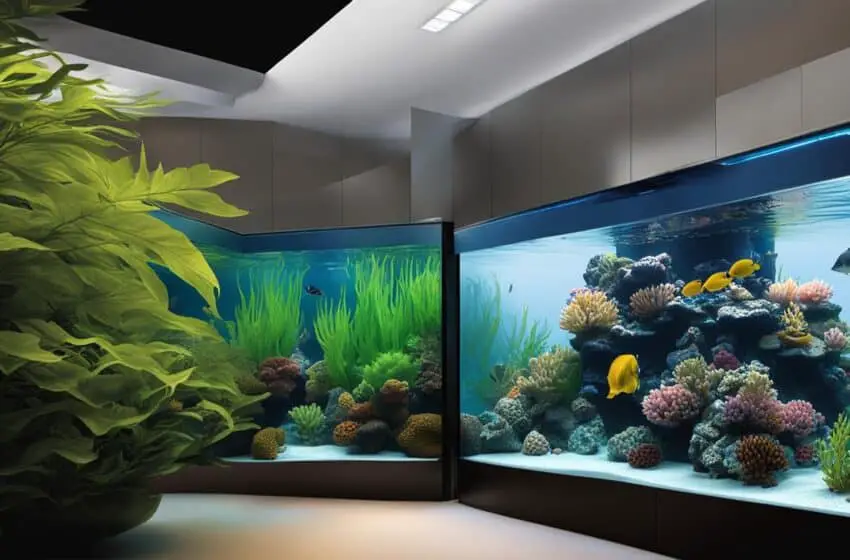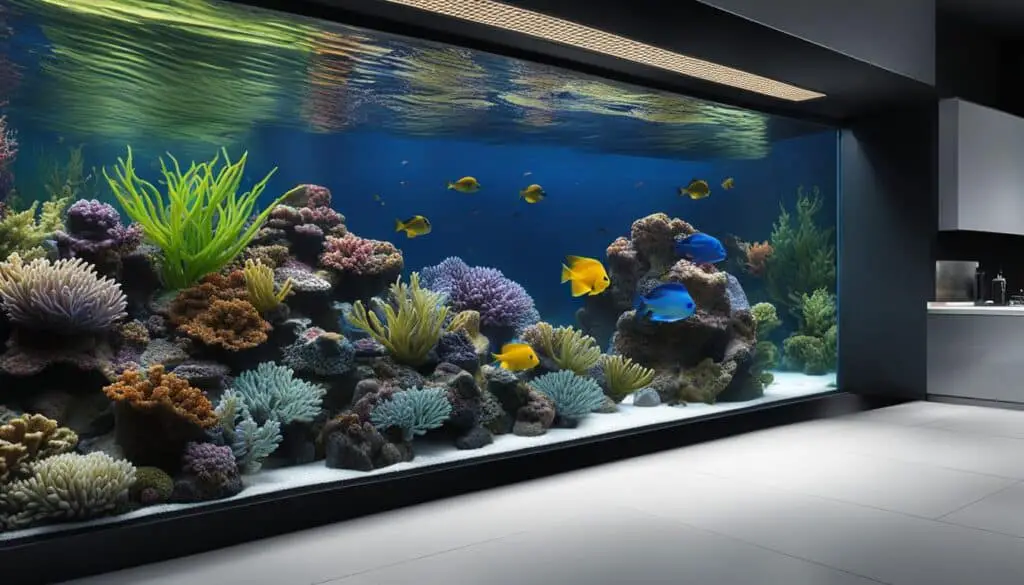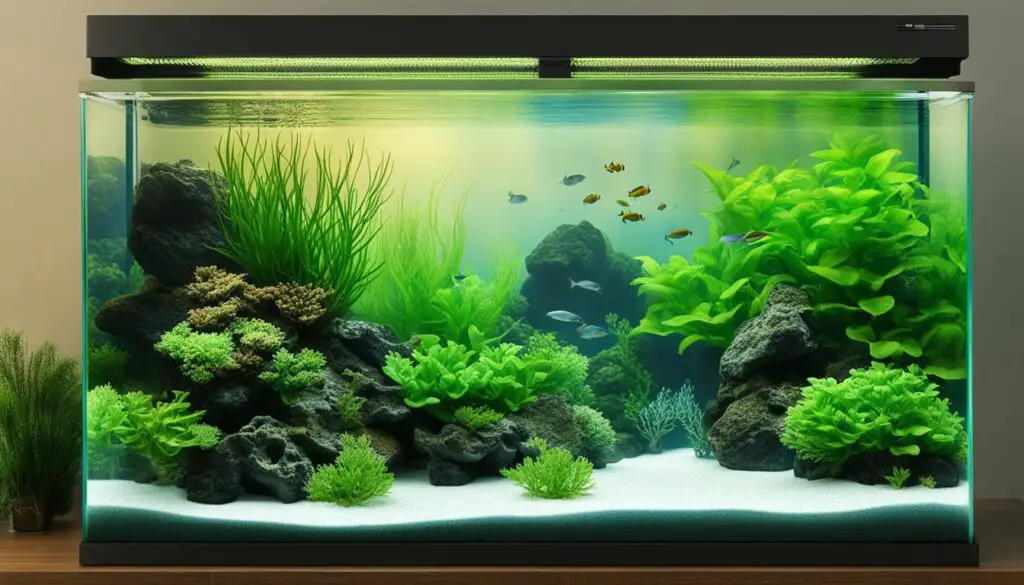Minimizing Noise and Energy Consumption in Filtration

Marine aquarium filtration systems are essential for maintaining a clean and healthy aquatic environment. However, these systems often consume a significant amount of energy and can generate noise that disrupts the tranquility of the aquarium. In this article, I will explore strategies and technologies that can help minimize noise and energy consumption in marine aquarium filtration systems, allowing for a more efficient and peaceful aquarium environment.
Key Takeaways:
- Energy-efficient marine aquarium filtration systems can help reduce electricity consumption.
- Minimizing noise in filtration systems enhances the tranquility of the aquarium.
- Implementing proper power ground layout and shielding techniques can address sources of noise.
- Optimizing power consumption without compromising audio performance is possible with technology like SigmaDSP.
- Filtration efficiency is crucial for maintaining a healthy and clean environment for marine life.
The Impact of Noise and Power Consumption in Marine Aquarium Filtration Systems
Marine aquarium filtration systems are crucial for maintaining a healthy and clean aquatic environment for marine life. However, these systems often face challenges such as noise generation and high power consumption. These issues can disrupt the tranquility of the aquarium and increase operational costs. It is essential to understand the sources of noise and the power consumption involved to address these challenges effectively.
Sources of Noise in Marine Aquarium Filtration Systems
One of the primary sources of noise in these systems is the high-power amplifiers used to drive the speakers. These amplifiers can inadvertently amplify noise to levels that are perceptible by human ears. Additionally, power-supply noise and filter/buffer noise can contribute to the overall noise floor in the system. Improper power ground layout can also exacerbate noise issues.
Power Consumption in Marine Aquarium Filtration Systems
The power consumption of marine aquarium filtration systems can be significant, especially when the amplifiers are operating continuously. This constant energy usage can lead to higher electricity costs and environmental impact. Addressing power consumption is crucial for creating more sustainable and energy-efficient systems.
“The amplification of noise in marine aquarium filtration systems can disrupt the tranquility of the aquarium and affect the overall experience.”
To effectively minimize noise and power consumption, it is important to implement strategies that target the sources of noise and optimize energy usage. By addressing these challenges, aquarium enthusiasts can create a more optimal and peaceful aquatic environment for marine life.
| Noise Reduction Strategies | Power Consumption Reduction Strategies |
|---|---|
|
|
Strategies to Minimize Noise in Marine Aquarium Filtration Systems
To minimize noise in marine aquarium filtration systems, proper power ground layout and shielding techniques can be implemented. This helps reduce the impact of power-supply noise and filter/buffer noise on the overall system.
One effective strategy is to ensure a meticulous power ground layout. By carefully designing and organizing the power and ground paths, the potential for noise interference can be minimized. This includes separating the power and signal grounds and optimizing the placement of decoupling capacitors to reduce high-frequency noise.
Shielding techniques can also be employed to further reduce noise. By enclosing sensitive components and wiring in shielded enclosures or using shielded cables, electromagnetic interference (EMI) and radio frequency interference (RFI) can be reduced, resulting in a quieter filtration system.
Another common issue in aquarium filtration systems is the occurrence of pop noise during power on/off. This can be addressed by using capacitors to provide isolation between different voltage supplies. These capacitors act as a buffer, absorbing sudden voltage spikes and preventing pop noise from reaching the speakers.
Furthermore, optimizing the use of the SigmaDSP processor, an audio post-processor, can significantly contribute to reducing the noise floor in marine aquarium filtration systems. By applying advanced digital signal processing algorithms, the SigmaDSP processor improves the overall audio quality and minimizes unwanted noise.
Implementing these strategies not only minimizes noise but also enhances the overall audio experience in the aquarium, creating a more serene and enjoyable environment for both marine life and aquarium enthusiasts.

Key takeaways:
- Proper power ground layout helps minimize noise in marine aquarium filtration systems.
- Shielding techniques, such as shielded enclosures and cables, can reduce electromagnetic and radio frequency interference.
- Using capacitors to isolate different voltage supplies can address pop noise during power on/off.
- The use of SigmaDSP processors optimizes audio quality and reduces the noise floor in the system.
- Implementing these strategies enhances the overall audio experience and tranquility of the aquarium.
Strategies to Reduce Power Consumption in Marine Aquarium Filtration Systems
In order to minimize power consumption in marine aquarium filtration systems, it is important to implement energy-efficient solutions. One such solution is the utilization of SigmaDSP technology, which offers a fully programmable audio DSP and control interfaces. This enables the optimization of power consumption without compromising the audio performance of the system.
One effective strategy to reduce power consumption is the implementation of an automatic detection system for input signals. This allows the power amplifier to be shut down when no sound is required, resulting in significant energy savings. By intelligently monitoring the audio input, the system can efficiently manage its power usage, reducing unnecessary energy consumption.
Additionally, the use of a Variable Speed Drive (VSD) with pressure control can optimize the energy efficiency of the fan system within the filtration setup. The VSD adjusts the speed of the fan based on the pressure requirements, ensuring the system operates at the most energy-efficient level. This not only reduces power consumption but also extends the lifespan of the fan and reduces maintenance costs.
Implementing these strategies can have a substantial impact on reducing the power consumption of marine aquarium filtration systems, resulting in significant cost savings and a more sustainable approach to aquarium maintenance.
Advantages of Using Energy-Efficient Solutions:
- Reduced power consumption
- Lower energy costs
- Extended equipment lifespan
- Improved sustainability
- Enhanced environmental stewardship
| Advantages | Impact |
|---|---|
| Reduced power consumption | Significant energy savings |
| Lower energy costs | Reduced expenses for aquarium maintenance |
| Extended equipment lifespan | Lower replacement and maintenance costs |
| Improved sustainability | Reduced carbon footprint |
| Enhanced environmental stewardship | Contribution to a more sustainable future |
By adopting energy-efficient solutions and leveraging cutting-edge technologies such as SigmaDSP, marine aquarium enthusiasts can create a more sustainable and eco-friendly environment for their aquatic companions. Not only will the power consumption be reduced, but the overall operational efficiency of the filtration system will be enhanced, providing a more harmonious and efficient ecosystem within the aquarium.

The Importance of Filtration Efficiency in Marine Aquarium Filtration Systems
In marine aquarium filtration systems, maintaining a healthy and clean environment for marine life is of utmost importance. One crucial factor in achieving this is filtration efficiency. By increasing the filtration efficiency of these systems, we can improve indoor air quality, capture finer particles, and reduce airborne pathogens.
Filters with higher MERV ratings, such as MERV 13 or HEPA filters, play a significant role in enhancing the filtration capabilities of marine aquarium filtration systems. These filters have the ability to capture smaller particles, ensuring cleaner water and a healthier environment for marine life.
However, it is essential to consider the potential impact of higher filtration efficiency on energy consumption. As filtration efficiency increases, there may be an associated increase in pressure drop, which can affect fan systems and potentially lead to increased power consumption.
| Filtration Efficiency | Air Quality | Particle Capture |
|---|---|---|
| Higher MERV ratings | Improved indoor air quality | Capturing finer particles |
| Potential impact on energy consumption | Reduction of airborne pathogens | Enhanced filtration capabilities |
It is crucial to strike a balance between filtration efficiency and energy consumption in marine aquarium filtration systems. Consideration should be given to adjusting fan systems or exploring energy-efficient solutions to mitigate the potential increase in power consumption while still maintaining optimal filtration efficiency.
An Expert’s Insight:
“Filtration efficiency is a critical aspect of marine aquarium filtration systems. By capturing finer particles and reducing airborne pathogens, we can create a healthier and cleaner environment for marine life. However, it is essential to carefully assess the potential impact on energy consumption to ensure a sustainable and efficient system.” – Dr. Jane Thompson, Marine Biologist
To summarize, filtration efficiency plays a vital role in marine aquarium filtration systems, contributing to improved air quality and particle capture. By using filters with higher MERV ratings, we can enhance the filtration capabilities. However, it is important to carefully consider the potential impact on energy consumption and make adjustments accordingly.
Conclusion
Creating an optimal and efficient environment for marine life in your aquarium requires minimizing noise and reducing power consumption in the filtration system. By implementing strategies such as proper power ground layout, optimized signal processing, and energy-efficient solutions like SigmaDSP technology and Variable Speed Drives, you can enjoy a quieter and more energy-efficient filtration system.
In addition to noise reduction, it is crucial to consider the importance of filtration efficiency and its impact on air quality. By selecting energy-efficient marine aquarium filtration systems, you not only save on power consumption but also contribute to maintaining a healthier and cleaner environment for both marine life and aquarium enthusiasts.
Adopting energy-efficient technologies and implementing proper filtration strategies will not only enhance the overall performance of your marine aquarium, but it will also provide a more serene and tranquil environment for you and your aquatic companions. Invest in energy-efficient systems and enjoy the benefits of reduced noise, lower power consumption, and a more sustainable approach to marine aquarium filtration.
FAQ
How can I minimize noise in a marine aquarium filtration system?
To minimize noise, you can implement proper power ground layout and shielding techniques. Additionally, measures can be taken to address pop noise during power on/off, such as using capacitors for isolation and optimizing the use of the SigmaDSP processor for noise reduction.
How can I reduce power consumption in a marine aquarium filtration system?
Power consumption can be reduced by using energy-efficient solutions. This includes utilizing the SigmaDSP technology for optimized power consumption without compromising audio performance and implementing an automatic detection system to shut down the power amplifier when no sound is required. Using a Variable Speed Drive (VSD) with pressure control can also optimize the energy efficiency of the fan system.
What is the importance of filtration efficiency in a marine aquarium filtration system?
Filtration efficiency is crucial for maintaining a healthy and clean environment for marine life. Increasing filtration efficiency improves indoor air quality by capturing finer particles and reducing airborne pathogens. Filters with higher MERV ratings, such as MERV 13 or HEPA filters, can significantly enhance filtration capabilities.



